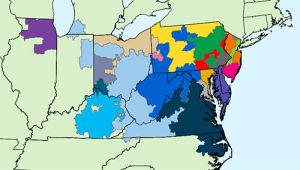A new ruling by the Federal Energy Regulatory Commission (FERC) brings Illinois one step closer to funding a fossil fuel bailout. And that increases the urgency to pass the Clean Energy Jobs Act (CEJA), sweeping legislation that would protect consumers’ power bills while moving the state toward 100 percent renewable energy.
On Thursday, Oct. 15, FERC issued the latest in a series of rulings that will revamp the rules for annual electric “capacity” auctions that have a significant impact on our electric bills. CUB warns that these changes will funnel more money to fossil fuel power generators, raise Illinois power bills, and undermine the state’s clean-energy and carbon-reduction goals.
While many people probably have never heard of the electric capacity market, this is one of the most important issues ever to face Illinois energy customers. Watch our recent Facebook Live where CUB Executive Director David Kolata and Deputy Director Sarah Moskowitz talk about this issue, and read our Q&A below.
Not only do you pay for the power you use now, but you also pay for power you could use in the future. Capacity refers to extra payments consumers give power plant operators for the commitment to have enough electricity available if demand suddenly spikes. (Think of a hot summer afternoon, when everyone blasts the AC.)

The PJM power grid stretches from Illinois to the East Coast.
The price for capacity for ComEd customers is determined through auctions run by PJM Interconnection, the power grid operator for northern Illinois and all or part of 12 other states and Washington, D.C.. (Ameren Illinois–the other major electric utility in the state–is in a market run by a different power grid operator.)
How does capacity affect my bill?
For most customers, capacity is not a separate line item on your power bills. The costs are embedded in the electricity supply charge. While actual electricity prices have been relatively low in recent years, capacity has become a bigger and bigger part of your bill and is now roughly 21 percent of the supply charge, according to the Illinois Commerce Commission. (By the way, alternative energy suppliers as well as ComEd participate in the capacity auctions. So you won’t escape capacity charges by changing suppliers.)
CUB has long said that capacity market rules are stacked against consumers, causing us to pay higher bills for more capacity than we actually need. Earlier this year, an analysis showed that customers in PJM territory overpay by up to $4.4 billion a year for capacity. Closer to home, ComEd customers are paying $1.8 billion per year for power plants to be on call for just a few hours a year, and $1.2 billion of that is going to fossil fuel power plants, according to experts in the Clean Jobs Coalition. (That’s a group of 200 consumer advocates, including CUB, environmental groups and community/business leaders who want to pass CEJA.)
Unfortunately, the new rule changes favored by fossil fuel generators and approved by FERC threaten to make the capacity market even worse.
How did FERC change the rules to the capacity market?
Last December, President Trump appointees at FERC changed the auction rules to artificially inflate the capacity price. As a result of a new minimum pricing rule, we would pay more on our electricity bills to prop up power generators—including coal-fired power plants—that normally wouldn’t be able to compete in the capacity auctions. Also, the rules would punish clean energy resources and make it more difficult for them to compete. In effect, Illinois consumers would pay more for power we don’t want.
Why do fossil fuel generators and their friends want to change the rules?
Big out-of-state corporations that own fossil fuel power plants—companies like Vistra, Calpine, and NRG—and their allies want to change the capacity auction rules to offset state legislation, like Illinois’ historic Future Energy Jobs Act. The act, passed in 2016, expands energy efficiency and gives financial support to clean energy generators, helping to drive down prices in the capacity market. That’s good for our power bills, but it makes it difficult for coal-fired plants to compete.
CUB Executive Director David Kolata has said the changes will have “devastating consequences for Illinois consumers” and punish the state for making clean energy improvements like FEJA.
How much would this cost consumers?
The latest estimate found that it could cost ComEd customers up to $1.7 billion in higher power bills over the next decade.
The one FERC commissioner to oppose the majority’s orders on capacity has argued that they are an attempt to undermine states’ clean energy goals. “The states are getting increasingly restless as they see the commission blocking their efforts,” said FERC Commissioner Richard Glick. “Everyone can see where this will lead, and it’s not a pretty picture.”
Greentech Media reports that several other states have proposed removing themselves from the capacity market over fears that the new rules will hurt their clean energy policy.
What can I do?
Please send a message to your state legislators asking them to support the Clean Energy Jobs Act. Illinois needs time to set up its own capacity market, so it’s vital that we pass CEJA as soon as possible. Don’t let fossil fuel generators control our electric bills.

